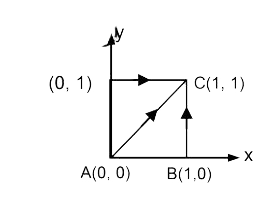A particle of mass 2kg moves in the xy plane under the action of a constant force →F where →F=ˆi−ˆj. Initially the velocity of the particle is 2ˆj. The velocity of the particle at time t is
12(t+4)ˆi−12tˆj
t(ˆi−ˆj)
12t(ˆi−ˆj)
12tˆi+12(t+4)ˆj
The correct Answer is:A
m=2kg,→F=ˆi−ˆj.
⇒→a=→Fm=12(ˆi−ˆj)
Now →V=→u+→at.
⇒→V=2ˆi+12(ˆi−ˆj)t.
=(2+t2)ˆi−t2ˆj=12(t+4)ˆi−t2ˆj
Alter : Substitute t=0 in option and get answer
Topper's Solved these Questions
- DAILY PRACTICE PROBLEMSBOOK - RESONANCECHAPTER - DAILY PRACTICE PROBLEMSEXERCISE - dpp 15
8 Videos
- DAILY PRACTICE PROBLEMSBOOK - RESONANCECHAPTER - DAILY PRACTICE PROBLEMSEXERCISE - dpp 16 physics
8 Videos
- DAILY PRACTICE PROBLEMSBOOK - RESONANCECHAPTER - DAILY PRACTICE PROBLEMSEXERCISE - Dpp no. 13 physics
5 Videos
- CURRENT ELECTRICITYBOOK - RESONANCECHAPTER - CURRENT ELECTRICITYEXERCISE - Exercise
54 Videos
- ELASTICITY AND VISCOCITYBOOK - RESONANCECHAPTER - ELASTICITY AND VISCOCITYEXERCISE - Advanced Level Problems
9 Videos
Similar Questions
A particle moves in the x−y plane under acceleration →a=3ˆi+4ˆjm/s2. If the initial velocities is →u=6ˆi+8ˆjm/s. Find the velocity and the position vector of a particle after 2s.
View SolutionA particle of charge q and mass m starts moving from the origin under the action of an electric field →E=E0ˆi and →B=B0ˆi with velocity →v=v0ˆj. The speed of the particle will become 2v0 after a time
View Solution
Knowledge Check
An object of mass 2 kg at rest at origin starts moving under the action of a force
→F=(3t2ˆi+4tˆj)N The velocity of the object at t = 2 s will be -A(3ˆi+2ˆj)m/sB(2ˆi+4ˆj)m/sC(4ˆi+4ˆj)m/sD(3ˆi−4ˆj)m/sA particle has initial velocity →v=3ˆi+4ˆj and a constant force →F=4ˆi−3ˆj acts on the particle. The path of the particle is :
Astraight lineBparabolicCcircularDellipticalA particle of mass 2kg moves with an initial velocity of (4ˆi+2ˆj)ms−1 on the x-y plane. A force →F=(2ˆi−8ˆj)N acts on the particle. The initial position of the particle is (2m,3m). Then for y=3m,
APossible value of x is only x=2mBPossible value of x is not only x=2m, but there exists some other value of x alsoCTime taken is 2sDAll of the above
A particle of mass 2kg moves with an initial velocity of →v=4ˆi+4ˆjms−1. A constant force of →F=20ˆjN is applied on the particle. Initially, the particle was at (0,0). The x-coordinates of the particle when its y-coordinates again becomes zero is given by
View SolutionA particle of charge q and mass m starts moving from the origin under the action of an electric field →E=E0ˆiand→B=B0ˆi with a velocity →v=v0ˆj. The speed of the particle will become 2v0 after a time.
View SolutionA particle moves with a velocity 6ˆi−4ˆj+3ˆkm/s under the influence of a constant force →F=20ˆi+15ˆj−5ˆkN.
The instantaneous power applied to the particle is
View SolutionA particle of mass m moves from A to C under the action of force →F=2xyˆi+y2ˆj , along different paths as shown in figure.

View SolutionA body of mass 1kg begins to move under the action of a time dependent force →F=(2tˆi+3t2ˆj)N, where ˆi and ˆj are unit vectors along X and Y axis. What does will be developed by the source at time t ?
View Solution
